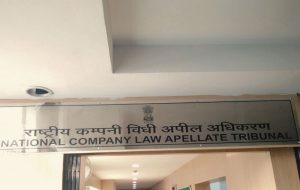National Company Law Appellate Tribunal: The appellant has challenged the order dated 14th July, 2017 passed by National Company Law, Tribunal, Chennai Bench wherein the Tribunal granted ‘waiver’ under the proviso to Section 244(1) of the Companies Act, 2013. According to the Tribunal, the petitioner had made out the case for grant of waiver under Section 244.
The NCLAT, New Delhi, while adjudicating the grant of waiver by the Tribunal, opined that the impugned order had been passed in a mechanical manner by the Tribunal without considering any exceptional circumstances to allow the application for ‘waiver’ under the proviso to sub-section (1) of Section 244, the Tribunal has not applied its mind as to whether (proposed) application under Section 241 merits consideration and whether it relates to ‘oppression and mismanagement’.
As the question of grant of ‘waiver’ under proviso to Section 244(1) fell for consideration before the NCLAT in Cyrus Investments Pvt. Ltd. v. Tata Sons Ltd., 2017 SCC OnLine NCLAT 261, the Appellate Tribunal considering the provisions held as follows:
“Under proviso to sub-section (1) of Section 244 now the Tribunal is required to decide the question whether application merits ‘waiver’ of all or any of the requirements as specified in clauses (a) and (b) of sub-section (1) of Section 244 to enable such member(s) to file application under Section 241. Such order of ‘waiver’ being judicial in nature, cannot be passed by Tribunal, in a capricious or arbitrary manner and can be passed only by a speaking and reasoned order after notice to the (proposed) respondent(s). The basic principle of justice delivery system is that a court or a Tribunal while passing an order is not only required to give good reason based on record/evidence but also required to show that after being satisfied itself the Court/ Tribunal has passed such order. To form an opinion as to whether the application merits waiver, the Tribunal is not only required to form its opinion objectively, but also required to satisfy itself on the basis of pleadings/evidence on record as to whether the proposed application under Section 241 merits consideration.”
NCLAT also explicitly held in Cyrus Investments case that The Tribunal is required to take into consideration the relevant facts and evidence, as pleaded in the application for waiver under Section 241 and required to record reasons reflecting its satisfaction to suggest that the applicants have made out some exceptional case for waiver and to form opinion on whether the proposed allegation pertains to ‘oppression and mismanagement’ of the company or its members. The merit cannot be decided till the Tribunal waives the requirement and enable the members to file application under Section 241. Declaring the impugned order in the instant case to be a non-speaking order, and disallowing the grant of waiver in favour of the respondents, NCLAT remitted the case back to the Tribunal for its decision on the question whether the application for ‘waiver’ merits consideration after notice and hearing the parties. [S. Ahmed Meeran v. Ronny George, 2017 SCC OnLine NCLAT 275, decided on 5.10.2017]

